This Is What It’s Like to Go to Work as a Queer Person with Mental Illness
June 02, 2020
Content created for the Bezzy community and sponsored by our partners. Learn More
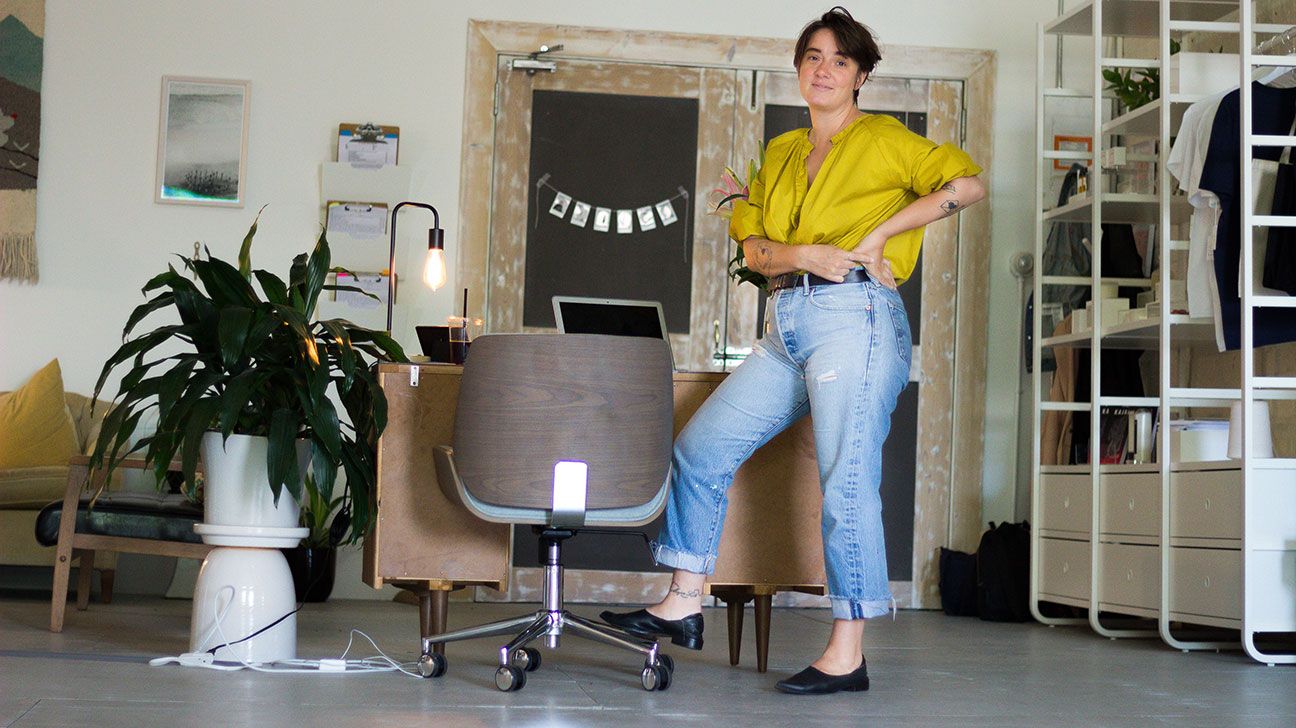
In an intimate portrait series, we uncovered what the work-life balance reality is like for queer people.
Out of the estimated 21,000 suicides (and counting) so far in the United States in 2018, it’s likely that roughly 10 percent of that is LGBTQ+.
But is it that surprising?
From the gender biases of many doctor’s offices to the shootings in gay night clubs and the U.S. Supreme Court deeming it legal for bakeries to discriminate against queer people, this country has always made it difficult to be a queer person.
LGBTQ youth are…
- three times more likely to experience a mental health disorder
- at a higher risk for suicide or have suicidal ideation
- two to three times more likely to misuse alcohol or substances
Some of us have the benefit of passing or hiding in plain site as a straight cis person. Some LGBTQ+ people, especially trans people, live between a claustrophobic space that limits expression in fear of safety. Meaning they can’t always express who they truly are or unveil their identities.
Doing so increases the risk of proven violence against queer and trans people, through employer dress codes or families and friends with anti-gay (often religiously charged) beliefs.


We’ve reached a moment in history where we can no longer ignore the epidemic of mental illness
This 21,000+ isn’t just a number. These are actual human beings; individuals with stories and feelings and lives. And what brings us all together, queer and straight alike, is our need to survive or, in more realistic terms, have and hold jobs.
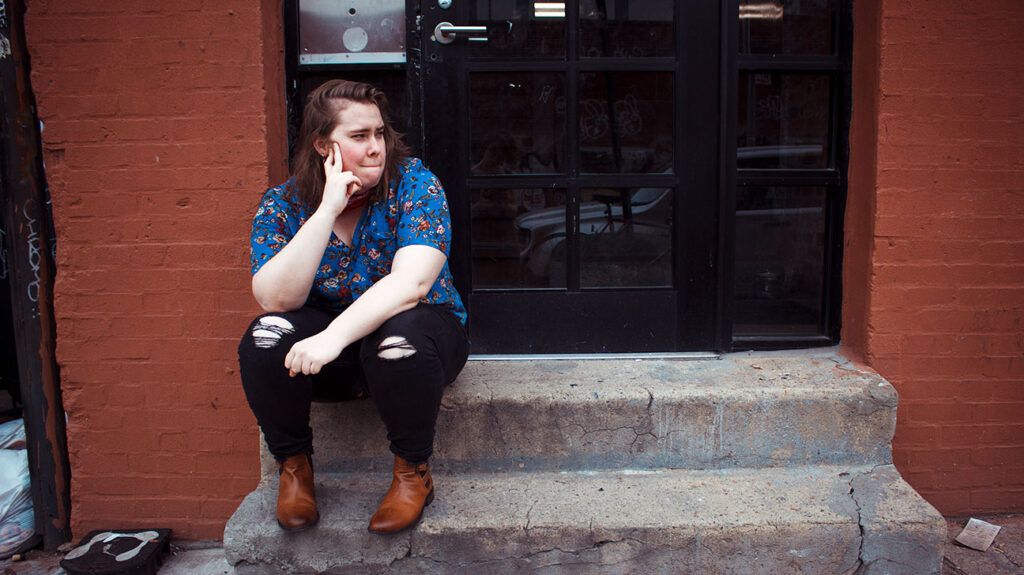
In fact, a recent survey showed millennials want to work for companies doing positive work for society. The results also cite diversity as a main catalyst for loyalty.
To go to the office as a watered-down version of yourself is an incredibly isolating feeling to have five days a week.
Nobody wants to wake up and feel the need for a separate wardrobe or make mental efforts to filter the way they speak about partners and dating. But according to Morgana Bailey’s TED Talk, 83 percent of LGBTQ+ people hide themselves at work.
The feeling of safety shrinks even more when a person who already has to hide who they are at work also has a stigmatized mental illness.
This photo essay unearths the unfortunate truth
The average workplace isn’t made for queer people or people with mental disorders.
I, a queer photographer with anxiety and depression, wanted to see how this stigma translated across workplaces, especially for millennials — the generation most open about mental health in the workplace.
Workplace culture has yet to find a way to promote and accommodate mental health. In fact, many young people have found various other approaches to generating income to avoid offices all together. In addition to mental health stigmas, many queer people don’t feel comfortable being out and proud at work.
The following stories are a raw look at the humans behind the statistics who live and breathe queerness and mental disorders every day.
On becoming freelance to ease when depression hits
Annaliisa, 31, freelance artist and art director
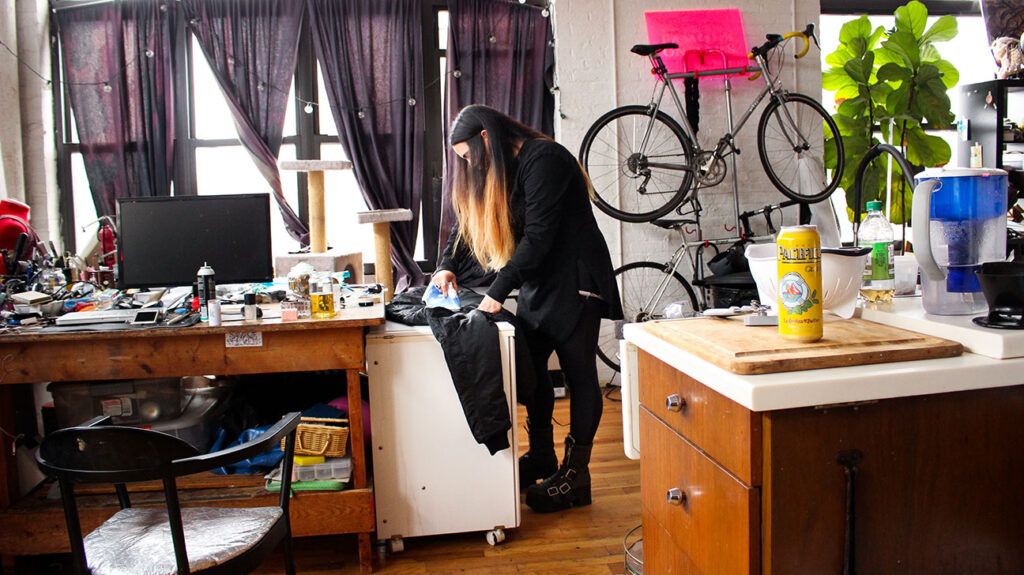
My mental illness was definitely affected by my queerness as a kid. I came out at 13. But I wanted to be a normal high schooler. I wanted to fit in. I was already different, I’m mixed [race], so I didn’t acknowledge my queerness publicly for a long time.
Art has become an excellent outlet for me to express my differences
I don’t wear [my depression] on my sleeve. My art is a reaction to having mental illness, but not specifically about it.
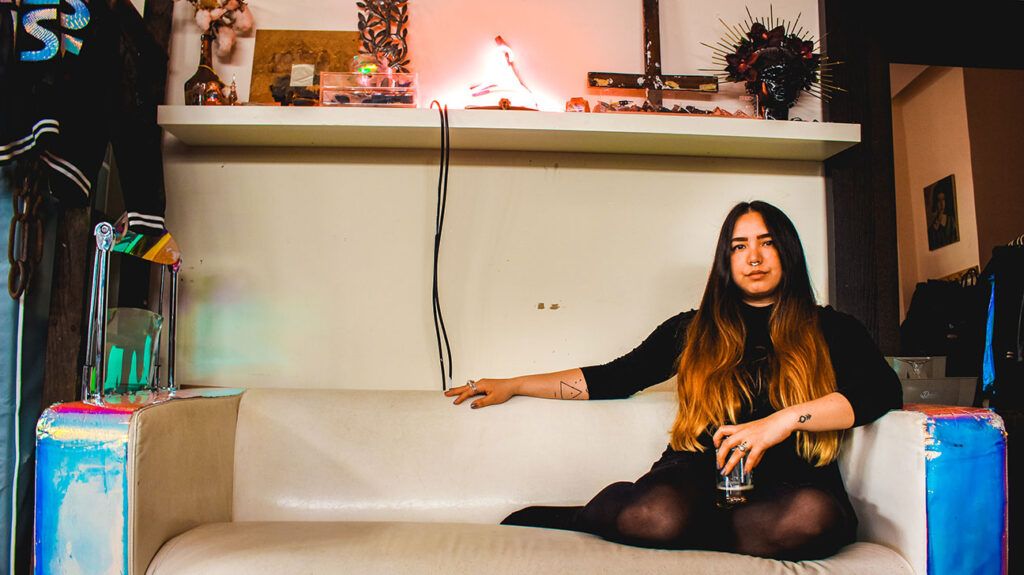
[Originally] I started working a 9-to-5 job as a personal banker and teller. But, I pushed to become a freelance artist and I’ve worked hard to stay freelance because when I have a strong bout of depression I can be out for a week.
Because of my depression, I’ve had to function outside of normal expectations and work structures, which is why freelancing works so well for me.
On having anxiety and pursuing an acting career
Montana, 26, actor
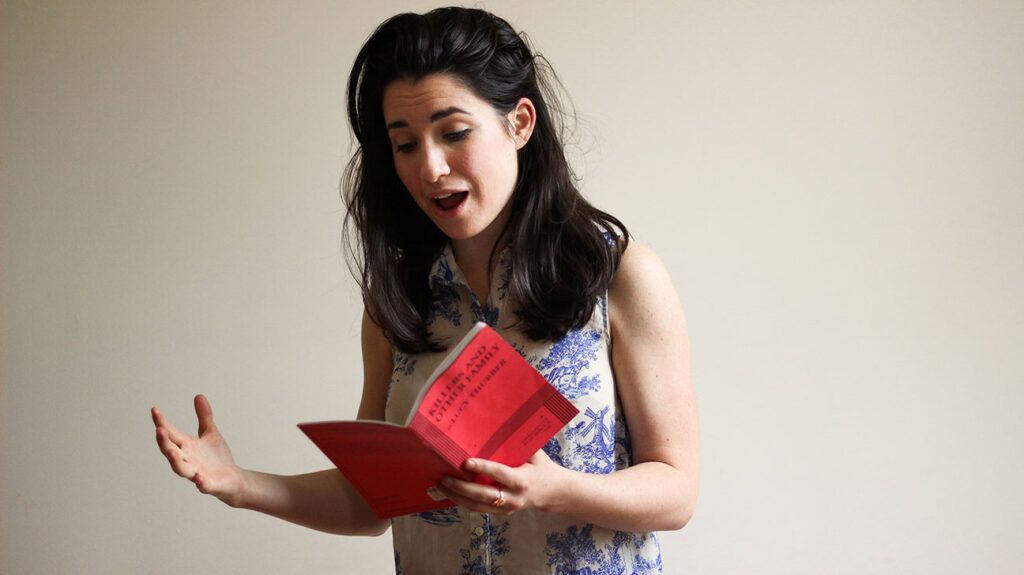
I get really anxious about letting people down. I get anxious about letting my serving job down because I’m not available enough or I’m sick. I get anxiety about putting my acting career first, which leads me to beat myself up constantly.
Also, when you get rejected in acting, they’re literally rejecting who you are, so that doesn’t help.
I identify as someone with anxiety [but] I’ve also had depression on and off, both related and not related to my sexuality and romantic relationships. I was very depressed in high school when I was severely bullied online.
Feeling alone is my biggest fear
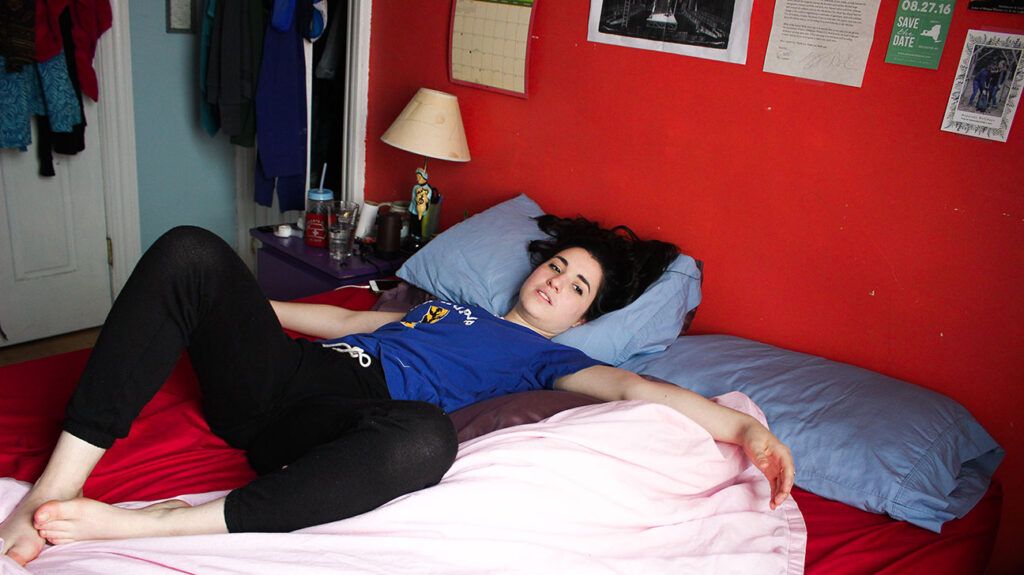
I came out my first year of college. In high school, I didn’t know bisexuality existed. Now, I’m very bad at being single. Not having somebody to text in the middle of the night is more anxiety-producing than not getting jobs as an actor.
Therapy helped me figure out these patterns but I’m not in therapy anymore because it’s too expensive and my insurance doesn’t cover it.
Did you know?
50.1 percent of Americans can’t afford therapy. A 2011 survey shows that 50 percent of 45.6 million Americans (insured and uninsured) who have any form of mental illness can’t afford therapy. A 2015 survey polled 2,020 adults over the age of 18 and 43 percent say seeing a professional isn’t affordable. In 2017, a research report found that behavioral care was often unaffordable, even with insurance.
On walking through the world as a queer person of color with a mental illness
Jenn, 32, art curator
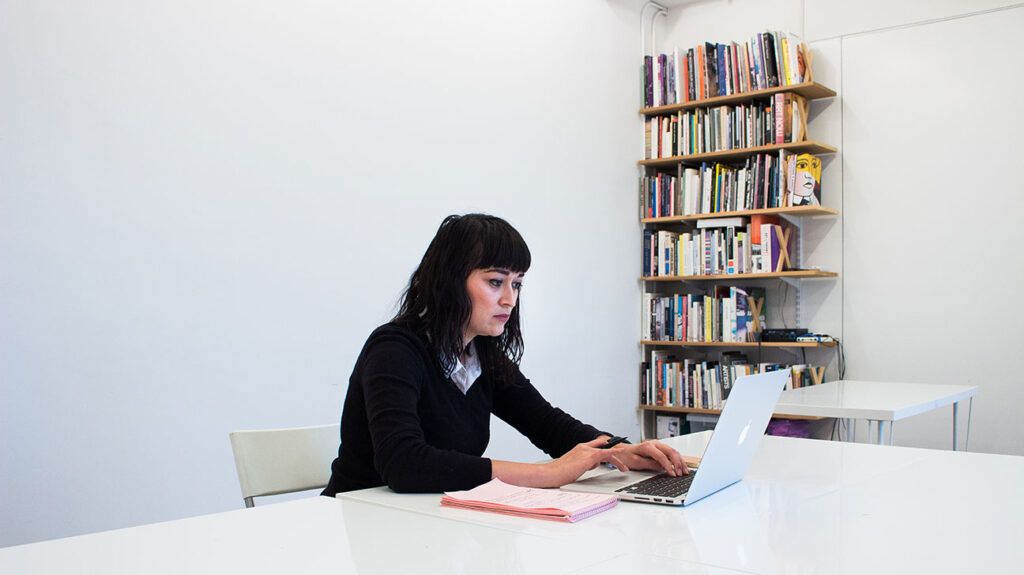
I identify as a queer person of color, emphasis on the person of color as of late. I’m less versed in talking about my mental illness. I’ve very, very recently started to talk about it. Even talking about it is anxiety-inducing.
I have a disorder where I have problems with language recall. I forget names, I forget nouns. It became more noticeable in grad school when I had to start talking on the fly. I explain it to people by saying it I’m a slow thinker. I’m great in bars. It’s like when you study a second language and it comes out better when you’ve had a drink — that’s how I am but with my first language.
My current job is very deadline-oriented, which means I can prepare for it. I have 60-hour work weeks, but I can navigate that because I can prepare.
When I have to speak to our board of trustees or speak in public, it poses a problem. My boss wants me to be proactive talking to funders and foundations, which is great for me career-wise, but if I can’t prepare, it poses a huge problem.
My office doesn’t know anything
They don’t know about my issues with language. They don’t know about my mental disorders. I’m not super out. My co-workers I’m friends with know that I go on dates with girls, but I’ve never come out. Because of this, my boss isn’t prepared to pick up the slack when I’m spiraling out of control.
I didn’t think my queerness and mental illness intersected, but in this era of 45 [Trump] it’s now challenging to walk through the world as a queer person of color.
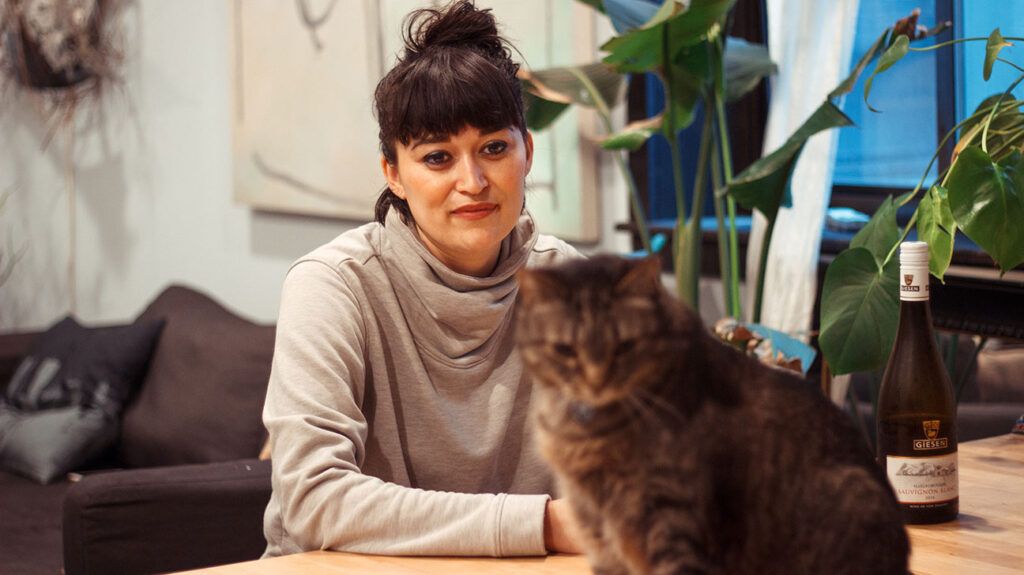
On stigmas of disorders and how they keep us from speaking out
Rodney, 31, film distribution
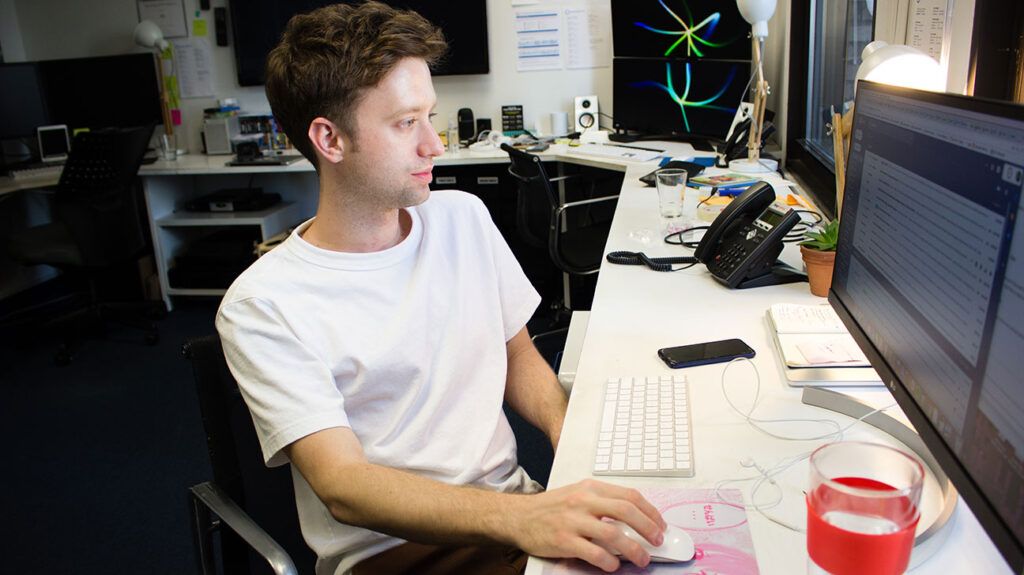
I don’t really think about my identity. I’m a white male who probably reads as straight, so it’s not something I actively think about. It’s a privilege I don’t have to think about it too much.
[While] I don’t identify as mentally ill, I do have insomnia. I usually fall asleep by 1 a.m., wake up a few times in the middle of the night, and then wake up at 7 a.m.
For example, I woke up at 3 a.m. and had the fear that the pictures I had just hung were going to fall. But I don’t feel clinically anxious during the day.
If I don’t get enough sleep [or wake up too many times at night], I’m lights out around 2 p.m. I’ll fall asleep during meetings. [But] I don’t expect any pity from anyone for not sleeping. I wouldn’t want to use it as an excuse for anything.
When you talk to doctors about it, they have this really Google-able answer: Keep to a regular schedule, don’t drink coffee after a certain time, set your phone to nighttime mode, exercise. I’ve done all that for years.
It doesn’t change
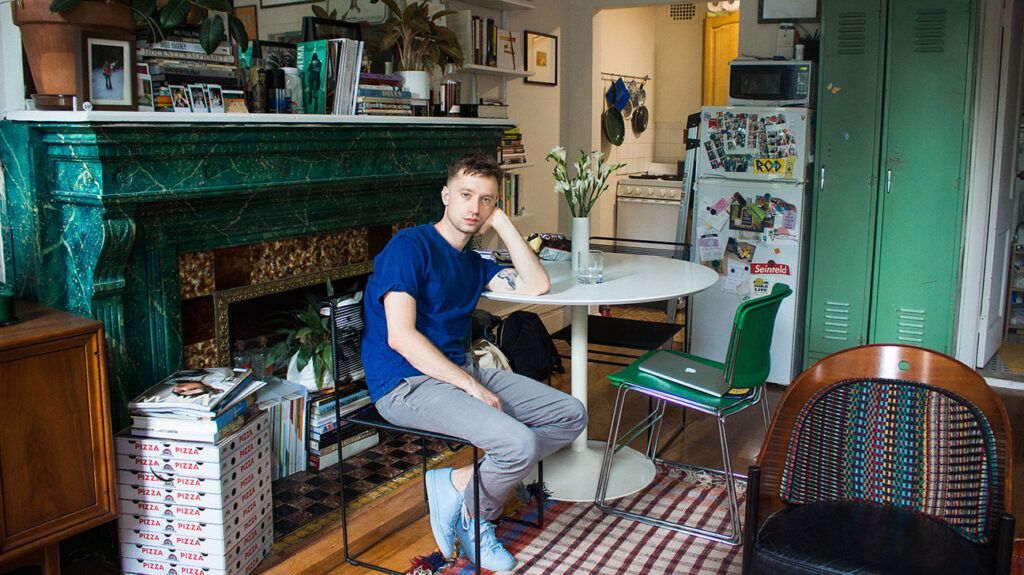
I wouldn’t tell my boss about it because I don’t want them to think about that when they look at my work. It doesn’t feel like a real excuse I can use because if you haven’t experienced it, you wouldn’t believe it.
Right after college, I started taking [over-the-counter] medication to sleep, with my shift into working full time. I’ve taken it [every night] since. I don’t remember the last time I slept through the night. I’m just used to it now.
[But] I won’t take prescription sleep medication. It’s so scary to me and I’d have to dedicate a true eight hours to sleeping. I can’t imagine sleeping eight hours a day. I can’t imagine wasting that much time in a day.
If cost or anxiety toward strong medication preventing you from getting care, you can also try natural sleep aids. It’ll take time, practice, and patience — but you got this!
On the cycle of panic attacks and exhaustion
Max, 27, marketing manager at a large-scale food brand
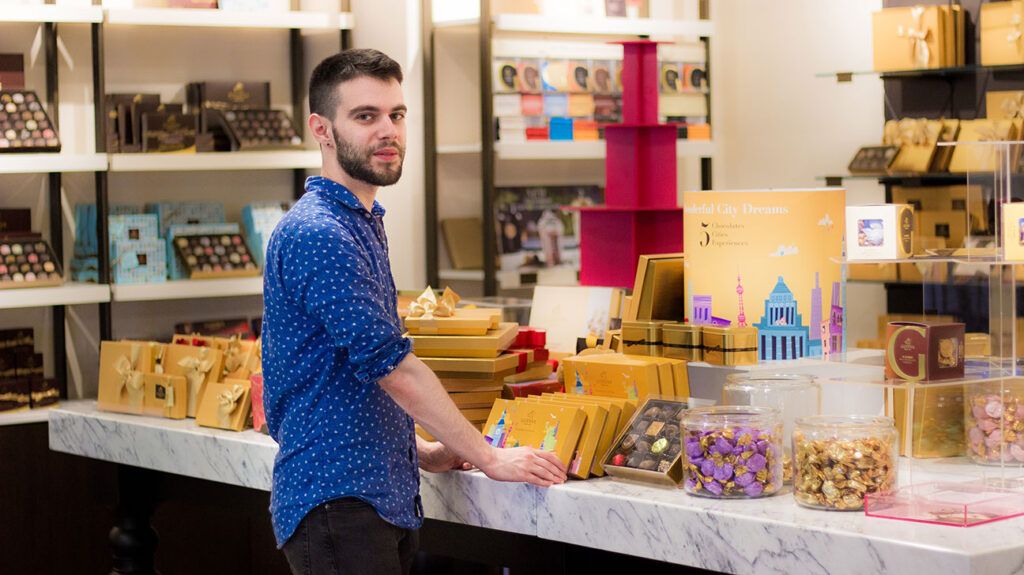
I have co-workers that don’t know I’m queer. I don’t feel closeted per se, but I just don’t talk about it.
I’ve stayed at my job for so long because of anxiety. The process of looking [for new opportunities] is anxiety-producing and I’ll come home so mentally drained that I don’t have the energy to even look. [But in my workplace] it’s more taboo to talk about mental illness than queerness.
I could never call out of work because of mental illness; I’d have to make up a [physical] sickness
I always have panic attacks on the subway. Sometimes it’ll make me late for work because I’ll obsessively check which trains have delays and then I’ll switch lines based on that. I could end up showing up 30 minutes late because of claustrophobia; I don’t want to get stuck between stations.
I have drugs with me at all times [in case] I’m having a panic attack. But I don’t go to therapy regularly anymore.
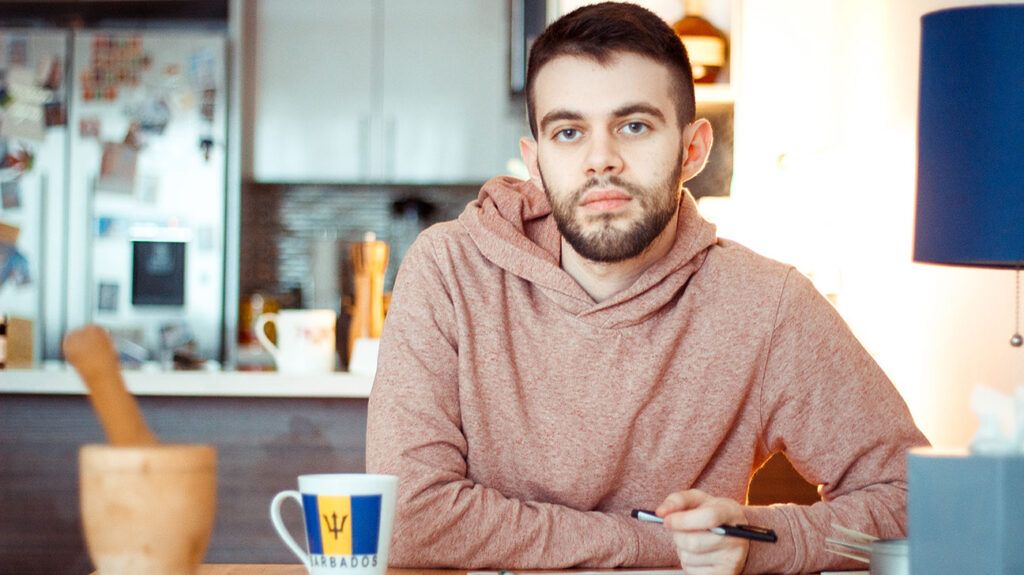
On opening up about depression in an accepting environment
Kristen, 30, tattoo studio manager
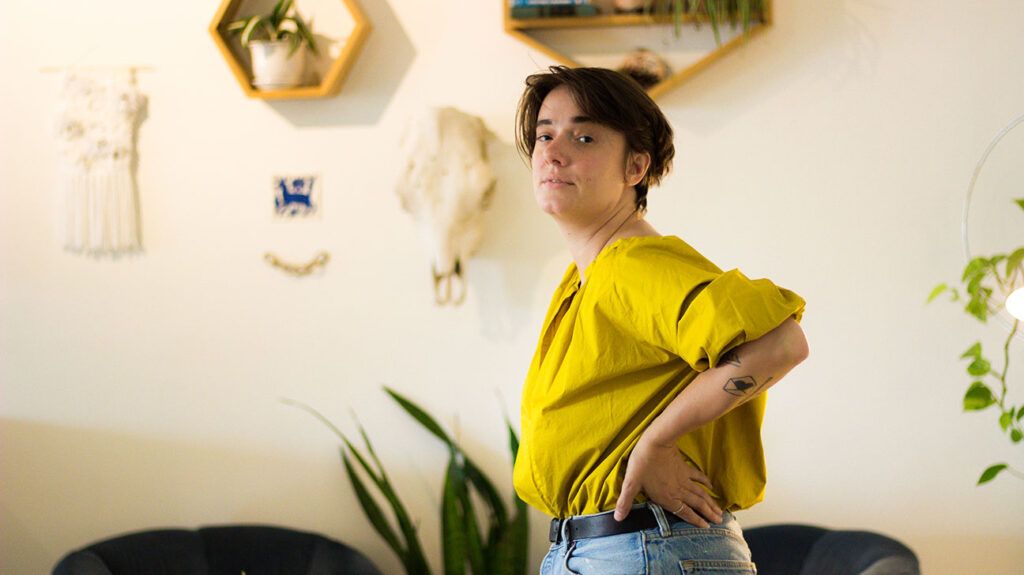
I don’t identify as mentally ill even though I’ve had a depression diagnosis since I was 16 and it runs thick in my family. It’s just there. I was on medication and I’ve had a couple people tell me I should be [back] on medication, but I’m very anti-medication — I’ve seen it cause horrible side effects in family members, so I’ll never do it again.
I had to quit my previous job as a property manager because of mental health reasons. It was too strenuous. I was out [as a lesbian] to my bosses, but I wasn’t allowed to be out to their kids [who I was constantly around] because the older generation was extremely homophobic.
They also didn’t believe in mental illness. I had to shove everything down.
Now it’s interesting because my bosses are very open about their mental illness
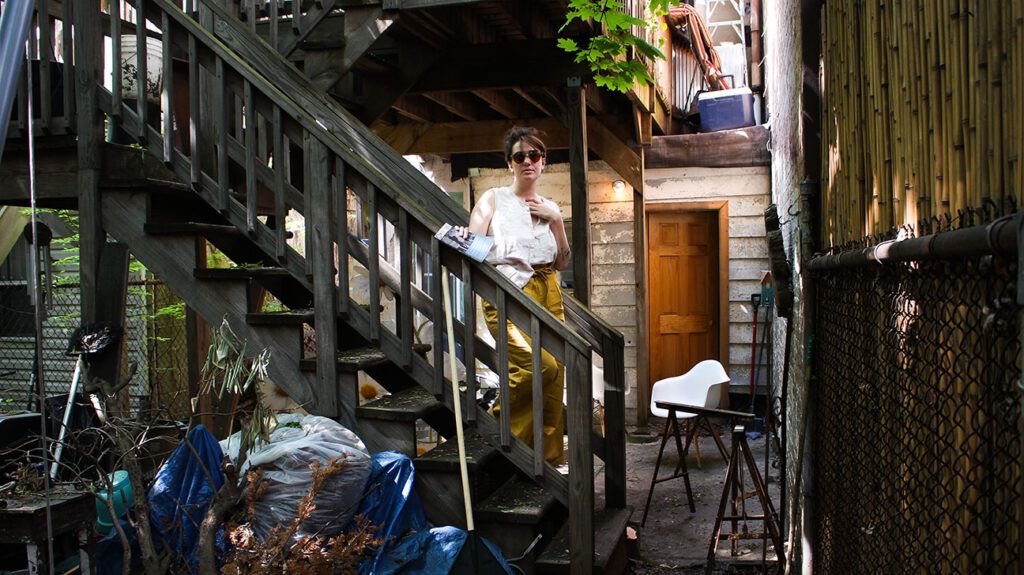
I’ve found that being in a place that’s more accepting of mental illness actually worsens my depression because it’s acceptable for me to come in [openly] depressed.
Lately I feel like my depression is all day all the time so I come to work focused on it and I just hate it. At my workplace before, I couldn’t be openly depressed so I had to put on a brave face, but here I can openly be depressed, which I think perpetuates my depression. Does anybody else feel like that?
In this new job, I’m completely myself. At my old job, I was two completely different people in and out of work because of my queerness, my mental health, everything.
On the importance of finding a company that has compassion
Kate, 27, advertising creative
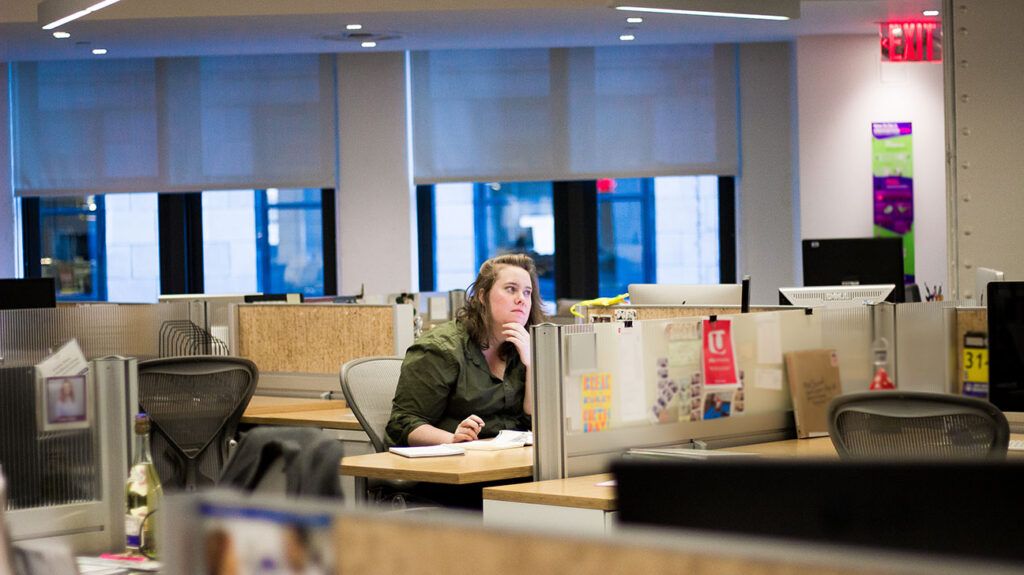
I identify as an Australian. A queer person. A feminist and activist. I definitely live with anxiety, but I don’t easily identify as someone with mental illness. There’s a lot of pride and defiance in how I exist as a person. It’s an attempt to seen as strong.
When my anxiety is triggered, it’s often triggered by work.
I put a lot of pressure on myself at work. I dreamt of getting into this career for a long time and worked really hard [toward it] so I feel a lot of duty to hold that up. It affects my work-life balance. I prioritize work and I don’t have a current method of parting with my anxiety when I leave the office.
When I was 20, my uncle was dying, my parents’ marriage was breaking down, there were a lot of things going wrong in my life. I was working at a movie theater. One of my managers gave me a direction and I didn’t like it and I just broke.
I had a complete breakdown
I couldn’t stop crying. It was a complete break from reality. I hid between two screening rooms and thought I was gone for ten minutes, but it was an hour. I had abandoned my post for an hour. That was my last day on the job.
People aren’t always going to understand what’s going on in your head, and you for sure aren’t always going to understand what’s going on in your head, but in the workplace there’s a certain level of professionalism you have to maintain.
I don’t know many queer people who don’t have anxiety. Coming out is a very solitary experience because no one can know but you. It’s the same thing for anxiety. Nobody can understand it unless you understand it.
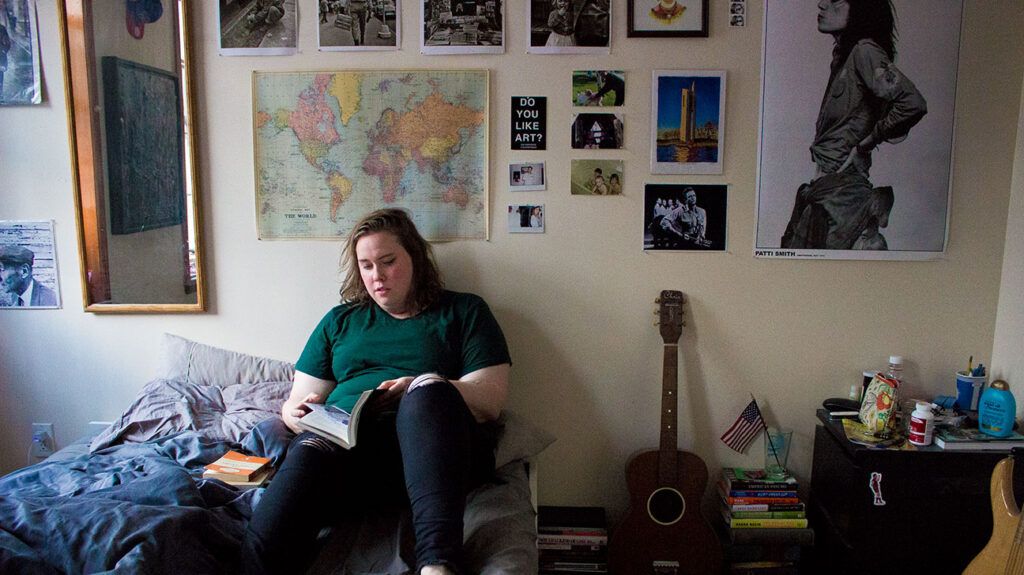
I went on a journey from knowing I like girls to knowing I like girls exclusively to being proud as a gay woman.
And it’s the same with gender. I had to discover that I can be on the gender spectrum and still identify as female. It’s better now with the support system and queer community I’ve cultivated.
At this point I wouldn’t work for a company that isn’t comfortable with queerness. There are too many companies in New York that see queerness as an asset to stay somewhere you aren’t wanted.
Use these resources if you or someone you know is in need of help:
- National Suicide Prevention Lifeline: 800-273-8255 or online
- The Trevor Project Lifeline for LGBTQ+ young people: 866-488-7386 or online
- CenterLink, National LGBTQ Centers
- American Psychology Association Psychologist Locator
You can also visit Youfindtherapy.com, a spreadsheet created by Crissy Milazzo, which lists resources for finding affordable therapy, a calculator to predict costs, and resources on what you can do if you can’t afford therapy.
Article originally appeared on Bezzy’s sister site, Healthline, on July 11, 2018. Last updated on June 2, 2020.
Fact checked on June 02, 2020
10 Sources


Like the story? React, bookmark, or share below:
Have thoughts or suggestions about this article? Email us at article-feedback@bezzy.com.